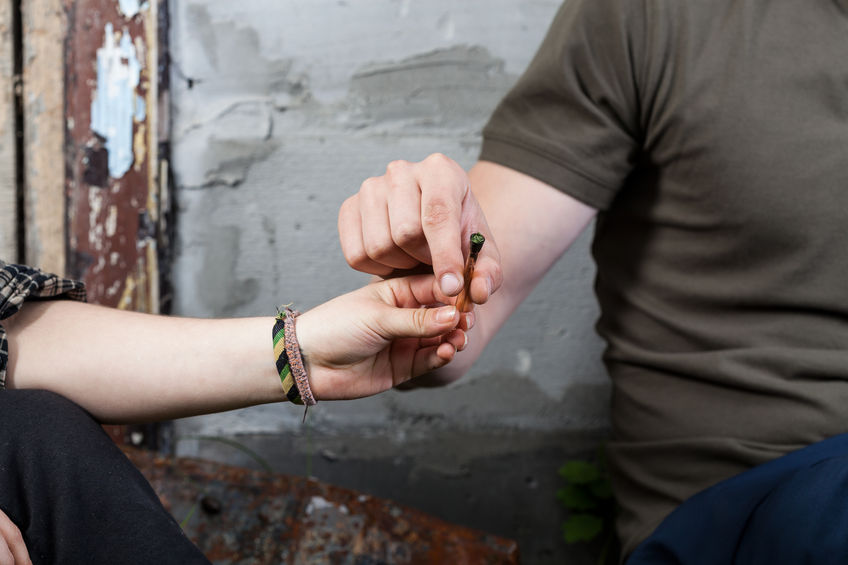A medical marijuana dispensary in Riverhead would send the wrong message to the town’s youth, according to the director of Riverhead Community Awareness Program, a drug and alcohol prevention group that is deeply involved in the Riverhead Central School District.
“This will just further normalize marijuana in our town,” said director Felicia Scocozza in an interview yesterday. “Our youth will see that this is something good, that it’s medication, that it’s not something dangerous.”
That’s why CAP and others have taken a stand against the planned medical marijuana dispensary on Route 58. The Riverhead Town Board is now considering blocking any dispensaries from opening in Riverhead for at least a year. The proposed moratorium is the subject of a public hearing tonight at Riverhead Town Hall. Some members of the Riverhead Town Board, like Supervisor Sean Walter, who says he believes medical marijuana is the “incremental legalization” of pot, have already stated opposition to the dispensaries — and medical marijuana — in general. Other board members simply object to the Route 58 location chosen by the state-registered distributor.
The planned location is perhaps the most contentious issue. The former Blockbuster site on Route 58 is less than 700 feet from Riverhead school district property. The site location does meet the requirements of state regulations, however, which require a dispensary, if located on the same street as a school, church, synagogue or other place of worship, to be more than 1,000 feet away. The distance is to be measured from door to door, not from property line to property line, according to state rules. And the rule comes into play only when the dispensary and the school are on the same street.
But there’s a path through the woods frequently used by students who walk to Route 58 to buy lunch or after school.
“High schoolers are always walking through that parking lot after school,” said Kelly Miloski, a community prevention specialist at CAP and a Riverhead High School graduate. “They’re going to be constantly exposed to it.”
One out of every four Riverhead High School seniors last year reported using marijuana in the past 30 days, according to a CAP survey. “Can we afford to take the chance of seeing our youth substance abuse rates rising even more?” Miloski asked.
 Columbia Care, which would operate the dispensary, is one of only five medical marijuana growers that have been licensed by the state to grow and sell the highly restricted drug. Medical marijuana will be available only in non-smokable forms, such as pills or liquids, and only to patients with a select few conditions, like cancer, HIV/AIDS, Lou Gehrig’s disease (ALS) and multiple sclerosis, among others. Over time, the drug may also become available to patients with other conditions as they are approved by the New York State Health Commissioner.
Columbia Care, which would operate the dispensary, is one of only five medical marijuana growers that have been licensed by the state to grow and sell the highly restricted drug. Medical marijuana will be available only in non-smokable forms, such as pills or liquids, and only to patients with a select few conditions, like cancer, HIV/AIDS, Lou Gehrig’s disease (ALS) and multiple sclerosis, among others. Over time, the drug may also become available to patients with other conditions as they are approved by the New York State Health Commissioner.
But though Riverhead CAP is concerned with even non-smokable forms falling into the wrong hands, it’s larger concern is a Riverhead dispensary’s impact on the attitudes of the local youth toward marijuana.
“As youth perception of risk goes down, their use of marijuana increases,” Scocozza said. “It’s not something teens should be seeing every day.”
Many studies have been done on the impact of medical marijuana laws on youth marijuana use, but there is not yet any consensus in their results. Some experts argue that medical marijuana laws have not been in place long enough to collect any meaningful long-term data on their effects on the teenagers in their states. Others say that additional factors, like changing attitudes toward marijuana within each state, are more important to rates of teen marijuana use than medical marijuana laws.
The most exhaustive study to date, released in June and surveying more than a million teenagers over a 24-year period, found that there was no relationship between a state’s passage of a medical marijuana law and an increase of adolescent use of marijuana. It did, however, find that adolescent use of marijuana was higher in states that allow medical marijuana than those that do not, but those higher rates also pre-dated the medical marijuana laws.
Regardless, Scocozza says her organization is not arguing “whether or not this should be legal.” Rather, she believes the town should do what it can to protect the youth in its own community.
“Community norms and availability are the biggest influence on our youths in terms of using marijuana,” she said. “All the education that you do in the schools can’t really compare to what the community norms are in the environment of the town.”
A Riverhead dispensary would be the only one in Suffolk County and one of only two on Long Island.
“There has to be someplace in the county that’s more accessible,” Scocozza said. The local share of a 7 percent state excise tax on medical marijuana sales — 22.5 percent of the tax collected by the state — would be paid to the county, not the town, Scocozza added.
“I’m concerned about the drain on our resources here in Riverhead,” she said. “If this is the only location here in Suffolk County, then there will be resources needed for all the people coming here. Police resources, EMS resources, an increase in hospital emergency room visits – and there’s no funding that goes along with it.
“Suffolk County’s getting the tax revenue,” she said. “It should be somewhere in the county that’s using county services.”
The public hearing on the proposed moratorium is scheduled to begin at 7:15 p.m. tonight at Riverhead Town Hall, 200 Howell Avenue.
The survival of local journalism depends on your support.
We are a small family-owned operation. You rely on us to stay informed, and we depend on you to make our work possible. Just a few dollars can help us continue to bring this important service to our community.
Support RiverheadLOCAL today.
































